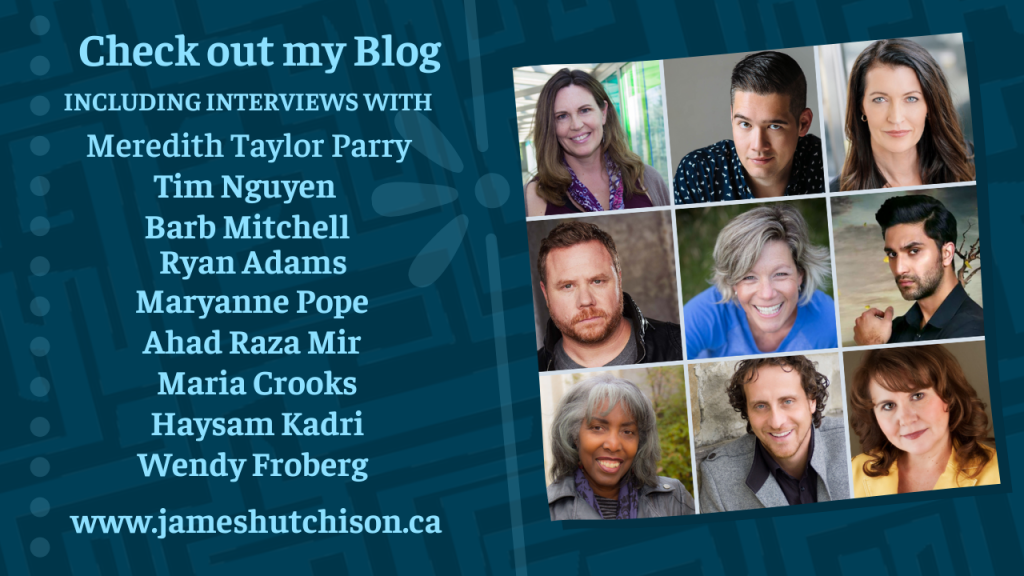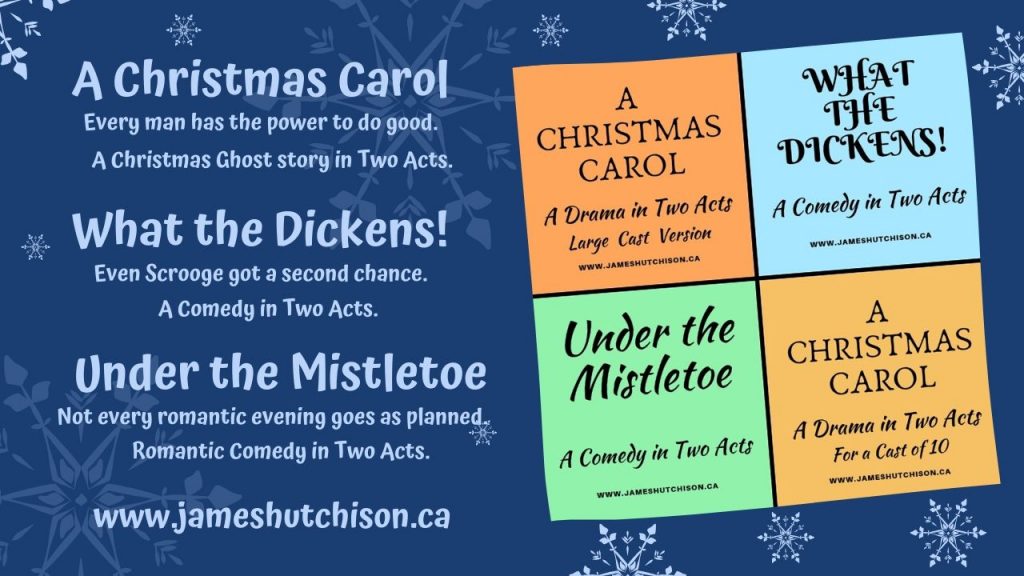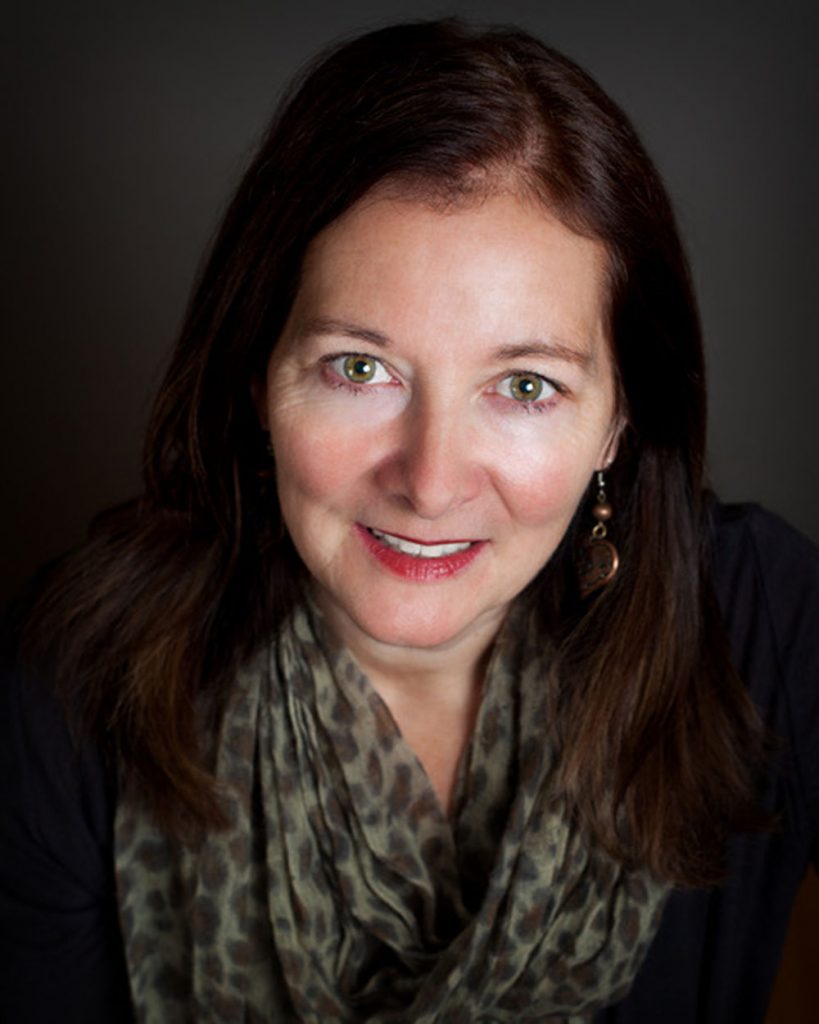
I love that quote from Ezra Pound that artists are the antenna of the nation. I love that because it’s as if artists are sort of tuned into the zeitgeist of what is important to people right now or what they’re talking about. But I don’t know if a play can ever change anything. I think it can ask questions. Generate discussion from viewers, but I don’t know if it’s actually where the change happens. I think change happens in people’s hearts, really.
Katherine Koller
Playwright – Novelist – Screenwriter
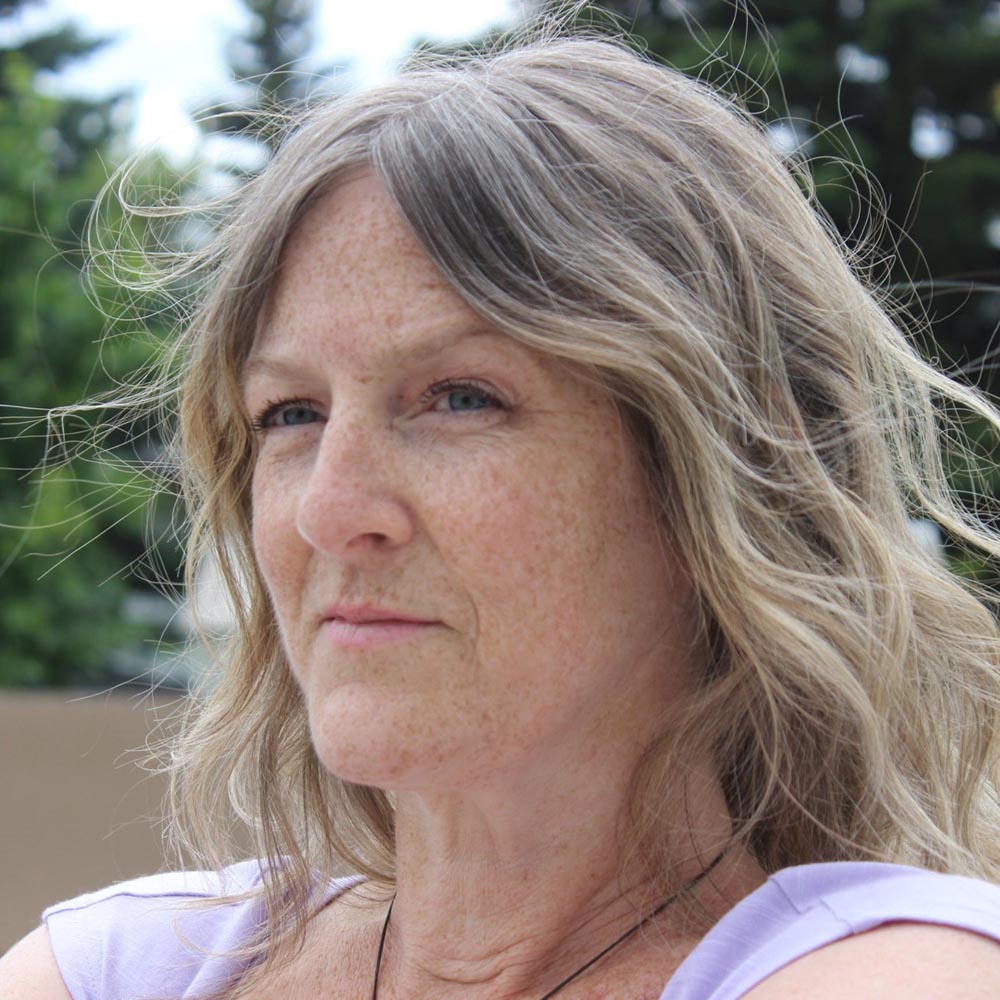
You know there’s research that’s been done with audiences that shows their heartbeats and breathing actually get into a rhythm while they’re watching the same play. There’s something really intimate and connecting about that. It’s amazing. Plus, theatre does hit at the heartstrings. Hits at the emotions. Hits at the brain waves. It does all those things and helps us think about issues and relationships – things that maybe we don’t often think about.
Tracy Carroll
Director – Dramaturg – Producer
For six years, playwrights, actors, and audiences have been gathering at Holy Trinity Anglican Church in Edmonton for a monthly play-reading series called Script Salon. While the in-person gatherings have stopped, due to COVID-19, Script Salon ended 2020 with an online reading of my romantic comedy Under the Mistletoe.
Under the Mistletoe is about Harvey Swanson and Nancy Potter, two old friends, who find themselves trying to navigate the tricky road of love, sex, and desire while spending a romantic night in the Candy Cane Suite at the Prairie Dog Inn Regina during the holiday season. The play will be performed by Ian Leung and Melissa Thingelstad and is being directed by Tracy Carroll.
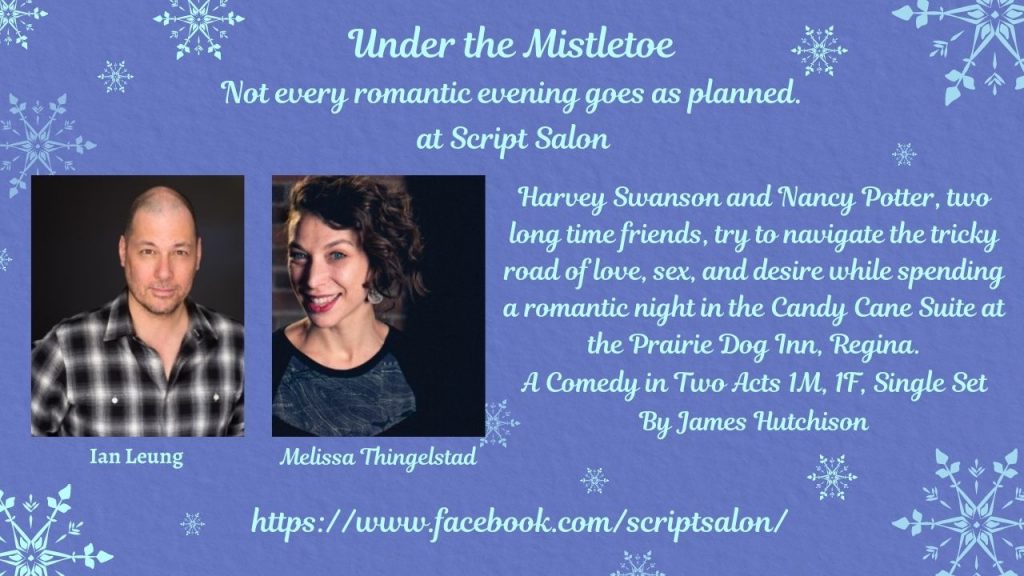
I connected with Katherine Koller and Tracy Carroll, the producers of Script Salon, over ZOOM a couple of weeks ago to talk with them about theatre, the origins of Script Salon, and their plans for 2021.
JAMES
I’m wondering, as artists, and as playwrights, and as theatre people, do you think people, as human beings, are ruled more by mind or emotion?
KATHERINE
I think it’s always going to be emotion. And I think that’s the brilliance of theatre because it hits us in the gut before it gets us in the head.
TRACY
I think it may depend on the person. Some people are led more by the heart, and some are led more by the head. It depends, I would think.
JAMES
You mentioned theatre, but how do you think stories, in general, appeal to the mind, to the intellect, of people.
KATHERINE
I think one of the big reasons we are story people is that we are curious to know how someone else has solved the problem that we may not yet have met. So, I think we’re constantly gathering evidence, both emotional and intellectual knowledge, to help us navigate a world in which there’s no guidebook.
JAMES
How much do you consider theatre, a collaborative art? And how much do you see theatre as an expression of an individual vision?
TRACY
It’s wholly collaborative. A hundred percent. Even though it can be an isolating kind of craft with the playwright often writing by themselves eventually the play will be read by someone else. Will be heard by someone else. The characters will come alive with actors. A director gets involved. The designers get involved. The dramaturg. Everybody. It’s always fully collaborative to me.
JAMES
It’s collaborative but then I also wonder about when you want to look at a block of work – a volume of work – a playwright’s ten or fifteen or twenty plays that they write in a lifetime, and I know there’s collaboration, but is there an individual vision in there as well that reveals itself over the course of the playwright, or actor, or director’s lifetime?
KATHERINE
I think, you know, when you put on a play, it’s actually layers of individual visions. I think the playwright has a vision at the beginning which gets elaborated on and challenged and sometimes, you know, surprisingly so, but that’s the nature of what it is. It’s collaborative. The designer has her vision. The lighting person has their vision, and so it’s like these layers of individual visions that go into making the whole, I think.
JAMES
And it’s not unusual for the playwright after seeing a production to rewrite the play and incorporate a lot of those ideas and visions into the rewrites and development of the play, I suppose, is it?
TRACY
That’s right. You’re really not doing it on your own, but when you’re talking about the canon of someone’s work, I think it really depends on the playwright. Some playwrights will write different things with different themes, and others will really hone in on specifics. I’ve worked with one writer quite a bit who pretty much one hundred percent has written about environmental issues in different ways. Other people will write about more personal things. About LGBTQ issues, or family issues, or other important issues in the world.
I had Beth Graham in last week as a guest in the young playwriting company at the Citadel Theatre and we were talking about her different ideas for her plays, because they seem quite varied. And she was asked, “Where do you get your ideas?” And she said, “I don’t know. Sometimes it’s from a headline. Sometimes it’s an image. Sometimes it’s a character. And then it sort of grows into something else. So, the plays are vastly different because they’re coming from different places.”
JAMES
Yes, mentioning Beth and her sensitivity to different inspirations makes me want to ask a question that often gets asked – do you think the theatre is more a reflection of society, or more a catalyst for change? Is it looking back, or is it looking forward?
KATHERINE
I think, it’s always a reflection of what’s going on, which could be a call to action or a desire for change. I love that quote from Ezra Pound that artists are the antenna of the nation. I love that because it’s as if artists are sort of tuned into the zeitgeist of what is important to people right now or what they’re talking about. But I don’t know if a play can ever change anything. I think it can ask questions. Generate discussion from viewers, but I don’t know if it’s actually where the change happens. I think change happens in people’s hearts, really.
TRACY
I agree. I think that’s why plays are so important. They’re a reflection – a little photo of the time – that we’re in, right? And I think that’s important. To reflect. Not just in plays but in art in general. Looking at what’s happening right now helps the future. Knowing the feelings and knowing the struggles helps us think about repeating those things or not repeating those things in the future.
So, for example, I’ll go into a different genre here. Theatre for young audiences is very much about teaching about a specific subject. So, if you’re teaching about bullying hopefully the play will change the future so that these kids, especially the bystanders, will know what to do when they encounter bullying in the future.
And otherwise, there’s a lot of discussion. Some of the best plays I think are when you go to the bar after – which we can’t do right now – but when you go to the bar after and you can really talk about the play and pull it apart and it really makes you think and talk and maybe it makes an individual make a change. You never know.
JAMES
I’m wondering, you mentioned zeitgeist. Because you are involved deeply with Alberta playwrights and the work that’s being done here is there an Alberta voice? Are there any unifying themes? Is there a unique Alberta voice out there that we can identify or not?
TRACY
For some playwrights their setting will be somewhere in Alberta, which of course affects the play. Theme wise – I don’t know. Have you noticed that Katherine?
KATHERINE
That’s a really tricky question. I mean there’s no limit to the kind of voices we hear in Alberta. I don’t think we have corralled ourselves into one category, or theme. I think in Alberta we’ve got so many different voices going on here…
TRACY
…a lot of diverse voices…
KATHERINE
…no one is like the other. That’s what I would say. No one sounds like the other person.
JAMES
I want to move on to Script Salon which is a series of readings that you have been doing up in Edmonton since 2014. I’m just wondering what was the genesis of Script Salon and how has it evolved over the last six years?
KATHERINE
Well, there were four of us in the room and we were all Playwrights Guild of Canada members, and we were trying to come up with a way to showcase work in Edmonton. And we wanted to access the membership of the PGC, and we wanted to elicit assistance from the Alberta Playwrights Network, and we happened to have access to this space at Holy Trinity Anglican Church. And then, you know, we thought, “Well we’ve got all these amazing actors in town who would jump at the chance to do a cold reading.” So, we put all those elements together and then later we expanded out a little bit to be more Alberta based. And then once we started, we realized we had something because people kept coming.
TRACY
And one of the amazing things is that about fifty percent, I think, have gone on to production.
KATHERINE
I think it’s up to like fifty-eight percent. It’s quite high. We started to get artistic directors coming to shows and then we started to get artistic directors coming in the room to rehearse the reading for the shows that they would then go on to direct. And so, we think it’s pretty awesome that theatre companies and playwrights are seeing us as a tryout for a production. It was really fun to see that we were part of that ecosystem of Edmonton theatre. But not all of these were produced in Edmonton. Some of them have gone and been produced in lots of other places.
JAMES
Well let’s talk a little bit about COVID-19 and 2020 here. You had to shift. I know you haven’t had your monthly readings. So, how has COVID-19 impacted Script Salon and then looking at 2021 – what is the plan?
TRACY
Well, one thing is the space, right. We always gathered at the church in this space and we haven’t been able to do that. So, it’s been sort of a challenge to try to figure out what to do. So, we took a pause. We had a little message back in April for our sixth birthday on our Facebook page, and other than that, we’ve been fairly silent except in September we had six writers read from their works. And we did that online. And it was wonderful. And now we’re going to do your Christmas piece which I think is a nice way to wrap up 2020 with some fun for our audience.
KATHERINE
One other thing I wanted to mention, James, about the success of Script Salon is the audience. We spent six years developing a really unique community. We open our doors about forty-five minutes before the show and it’s a racket in there. People are talking to each other and reconnecting. And you know, part of the fun is that they get to see each other again, and they get their drink and chat, and that’s something I don’t always see in the theatre. In the theatre I see this kind of anticipatory, you know, sort of hush, but not at Script Salon. I’ve had people in the audience come to me and say, “I so love this. I’m a theatre goer anyway, but when I come to Script Salon I feel like I’m part of the theatre. I feel like I’m contributing because I can hear the playwright talkback afterward, and I can ask a question, and I can go up to the playwright and give my compliments directly in person.” And those are things you can’t actually do very easily at a production. So, the audience part is essential to the way we do things and that’s why we were kind of at a loss when we couldn’t meet with our audience directly.
But then, when we did the readings in September. You know, we were very surprised at the loyalty of the audience coming in, and the feedback that we got afterward, and people were so happy that we were still alive. I don’t know how much we can speak about 2021 and what we’re going to do. We have one plan for January. Maybe Tracy you want to talk about that.
TRACY
In January of 2021, we’re going to do readings, just like we did in September, except we’re going to have all Albertan BIPOC writers, so they’ll read from their works. And then, in March, we will do readings from the Alberta Playwriting Competition. And in April, for our 7th anniversary, we’re going to do more readings from playwrights. And then we’re going to see what happens with COVID and if we can get back into our space.
JAMES
We were talking about collaborative versus individual vision, and then we touched on audience, and I guess your final collaborator in the creative process is the audience. And so, I’m wondering about your own thoughts about theatre as a social gathering as a community event. Why are you attracted to this community experience and the creation of theatre?
TRACY
Well, let’s see James, I started dancing when I was four, and I think I was Chicken Little when I was about six or seven.
JAMES
So, it’s been a lifelong passion.
TRACY
Indeed. Yeah, boy, it really feels when I think about theatre and the gathering tradition…ritual…I really…I really miss that. That’s for sure. And having that liveness in front of you – there’s just nothing like it, and it’s not the same on-screen. Although I’m really enjoying some things on screen. But that interaction with audiences is everything, whether it’s watching the play, or being in the lobby and talking about things beforehand or afterwards.
You know there’s research that’s been done with audiences that shows their heartbeats and breathing actually get into a rhythm while they’re watching the same play. There’s something really intimate and connecting about that. It’s amazing. Plus, theater does hit at the heartstrings. Hits at the emotions. Hits at the brain waves. It does all those things and helps us think about issues and relationships – things that maybe we don’t often think about.
Theatre really is about bringing community together, so it’s really challenging right now with COVID and I am hoping that all our theatres in Edmonton and Calgary can hang on and get through so we can do theatre in the future. We’ll get over it eventually. You know, the world has been through plagues before, and theatres have come back, so theatre is going to come back. There’s, I think, no doubt about that, but it’s shifting things. It’s making things different. I think that all this online stuff is really interesting because there’s a different kind of access for a lot of people, which is really fascinating to me. So, it might be an interesting way to keep new audiences coming by having some of this online interaction, you know, along with the live part.
KATHERINE
I do agree with Tracy that we’ve had to find other ways to access our need for theatre, and for myself, what’s happened is that audio drama has filled that niche probably more than zoom theatre or film, because I’m partially creating the show as I’m listening to it in my own head.
TRACY
And I think a lot of theatres, and a lot of theatre-makers are doing just unbelievably creative things whether it’s something live like a cabaret type of thing or something on screen or workshops or whatever people are offering, I think it’s amazing. And boy, the access has been incredible for artists to be able to…
KATHERINE
…to work with anybody…
TRACY
…right to work with anybody across the country. It’s just incredible. So, I hope that the creativity and collaboration just keep happening. And on top of COVID the other layer is a bigger awareness of Black Lives Matter and of BIPOC artists, being involved. That’s a whole other layer that’s going to shift our rehearsal halls, our readings, and our productions. We have to be more aware of everybody in the room and my hope is that we have a more inclusive working space for everyone.
Download – Interview with Tracy Carroll & Katherine Koller – Tuned into the Zeitgeist
This interview has been edited for length and clarity.
Under the Mistletoe
CAST
Ian Leung as Harvey Swanson
Melissa Thingelstad as Nancy Potter
Ian Leung is pleased to be reading at Script Salon again. His recent theatre credits include Pastor John in The Blue Hour (SkirtsAfire Festival), Daedalus in Slight of Mind (Theatre Yes), King Berenger in Exit the King (Studio Theatre), Wormold in Our Man in Havana (Bright Young Things), Professor Ogawa in Pugwash (Ship’s Company Theatre) and Trigorin in Stupid F**king Bird (Edmonton Actors Theatre).
Melissa Thingelstad received her BFA in Acting from the University of Alberta and has worked as a professional actor in Amiskwacîwâskahikan (Edmonton) for fifteen years. She is an Associate Producer for theatre no. 6, an Artistic Associate with Theatre Yes and was cocurator on the National Elevator Project. Her acting portfolio includes stage work, film work, and voice over. She has had the great privilege of working in Edmonton, Banff, Winnipeg, Washington, DC, London, England, and Halifax and is the recipient of three Elizabeth Sterling Haynes awards for acting. Theatre credits include: Slight of Mind, Viscosity, and The List (Theatre Yes), Stupid F@#king Bird and Fatboy (Edmonton Actors Theatre), An Accident (Northern Light Theatre), Kill Me Now (Workshop West Playwright’s Theatre), and Proud and The Fever (theatre no.6). Melissa has also collaborated on new works for a number of multidisciplinary festivals in the city including: Visualeyze Festival, Storefront Cinema Nights, The Expanse Movement Festival, and The Kaleido Festival.
Tracy Carroll has worked as a director, dramaturg, teacher and producer for over 20 years including 6 years as the Artistic Associate- North for Alberta Playwrights’ Network and Artistic Associate at the Citadel Theatre where she co-created and directed KidsPlay @ the Citadel.
She is the Coordinator of Peep Show!, a tease of new plays, which started during the inaugural SkirtsAfire Festival in 2013, co-producer of Script Salon, a monthly play-reading series featuring Alberta plays and playwrights and co-producer of EDMONten- A Showcase of Ten-Minute Plays.
Tracy was dramaturg on The Mommy Monologues, written by 10 women and produced at SkirtsAfire 2017. She also directed and dramaturged The Book of Ashes by Emil Sher for the Northern Alberta Children’s Festival, Last Chance Leduc by Katherine Koller and The Invention of Romance and Matara by Conni Massing at Workshop West Playwrights’ Theatre.
Tracy is facilitator of the Young Playwriting Company at the Citadel Theatre, teaches for the Writes of Passage program in schools, and has been offering online playwriting classes through her company Write-A-Play. She also teaches Drama in the Classroom to teachers and will be offering workshops at several Alberta Teachers’ Conventions in 2021.
Katherine Koller writes for stage, screen and page. Her first plays were for CBC radio. Her Alberta LandWorks Trilogy is Coal Valley: The Making of a Miner, The Seed Savers and Alberta Playwriting Competition winner, Last Chance Leduc.
Her opera, The Handless Maiden, received a recital reading in Vancouver and Hope Soup, for radio, was recorded at the 2019 Edmonton Fringe and available at https://playwrightsguild.ca/edmonton-script-salon-podcasts/.
Her web series, about Edmonton youth changing their world, is at sustainablemeyeg.ca. Art Lessons, her novel, was a finalist for the Edmonton Book Prize and the Alberta Readers’ Choice Award. Winner of a High Plains Book Award and the Exporting Alberta Award, Winning Chance is her recent collection of short stories.
